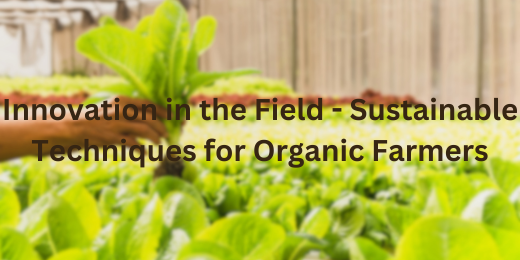
Innovation in the Field – Sustainable Techniques for Organic Farmers
Sustainable farming techniques
The Importance of Organic Farming in South India:
Sustainable farming techniques are crucial for organic farming, offering numerous environmental benefits. These methods reduce pollution and enhance soil health, ensuring long-term agricultural productivity. Organic farming techniques also help to maintain biodiversity by minimising pesticide usage.
The quality of food improves significantly with organic farming techniques, as they avoid synthetic chemicals. This promotes a healthier diet for consumers and supports ecological balance. Farmers adopting these methods can produce safer, more nutritious food, thereby benefiting public health.
Furthermore, sustainable farming techniques empower local communities by creating job opportunities and supporting small-scale farmers. These practices foster self-sufficiency and economic growth in rural areas. Organic farming emerges as a powerful driver for fortifying the socio-economic tapestry of South India.
Challenges Faced by Organic Farmers:
Organic farmers often face challenges such as lower yields compared to conventional farming, especially in the initial stages. These challenges can discourage new farmers from adopting sustainable farming techniques. However, with time and experience, yields can improve significantly.
Managing pests and diseases without synthetic pesticides is another major hurdle. Farmers must rely on organic farming techniques like crop rotation and natural pest control methods. These methods require more effort and knowledge, but they are essential for maintaining a healthy, sustainable ecosystem.
Obtaining organic inputs and navigating the certification process can present significant challenges for farmers, often due to limited availability and associated costs. They need to source organic seeds, fertilisers, and other inputs that comply with organic standards. Compounding these challenges, the certification process for organic farming can be intricate and require a significant time investment to navigate.
Innovative Techniques for Sustainable Organic Farming:
Sustainable farming techniques like crop rotation and intercropping play a crucial role in improving soil fertility and controlling pests. Planting legumes with vegetables, for instance, enriches the soil with essential nutrients. This approach fosters the development of more robust crops, consequently minimizing the reliance on synthetic fertilizers and pesticides.
Another effective practice is cover cropping, which involves growing cover crops between main planting seasons. This technique helps suppress weeds, improve soil moisture, and fix nitrogen, creating a more sustainable farming environment.
Natural pest control methods are essential in organic farming techniques. Using neem oil, predator insects, and biopesticides allows farmers to manage pests without harmful chemicals. These methods support a balanced ecosystem and promote healthier, more resilient crops.
Water Conservation Techniques:
Sustainable farming techniques like mulching are vital for water conservation. By covering the soil with organic matter, farmers can reduce evaporation and retain moisture. This method ensures that crops receive adequate water, even in dry conditions, promoting healthy growth.
Drip irrigation is another effective organic farming technique. It delivers water directly to plant roots, minimising waste and ensuring efficient water use. This technique not only conserves water but also helps in maintaining soil structure and reducing weed growth, enhancing overall farm productivity.
Water conservation through rainwater harvesting stands as a fundamental pillar of sustainable agricultural practices. By capturing and storing rainwater, farms can establish a dependable water source, mitigating the risks associated with drought periods and ensuring consistent crop irrigation throughout the year. This technique supports irrigation needs, reduces dependency on external water sources, and helps farmers manage water resources effectively.
Composting and Manure Management:
Sustainable farming techniques such as creating compost are essential for organic farming. This method diverts kitchen scraps and yard waste from landfills and transforms them into a potent fertilizer teeming with nutrients. This, in turn, cultivates a healthier and more vibrant soil profile. Not only does composting minimize waste, but it also promotes robust crop growth, solidifying its position as an environmentally friendly and productive practice.
Organic farming techniques like vermicomposting use earthworms to break down organic matter. This process produces nutrient-rich vermicompost, which is excellent for soil fertility. Vermicomposting is a natural and efficient way to recycle organic waste and boost agricultural productivity.
Managing livestock manure is crucial for sustainable farming. Composting or using bio-digesters to convert manure into fertilizer and biogas is beneficial. These sustainable farming techniques not only reduce waste but also provide valuable resources, supporting eco-friendly and efficient farming practices.
Resources for South Indian Organic Farmers:
Resources for South Indian Organic Farmers are abundant, with government initiatives playing a crucial role in promoting organic farming. These initiatives include subsidies, training programs, and certification support, aimed at encouraging farmers to adopt sustainable practices. This support is essential for the growth of organic agriculture in the region.
Local agricultural universities and research institutions provide valuable knowledge and research findings to South Indian farmers. These organizations provide valuable resources to farmers, including training programs, workshops, and knowledge-sharing opportunities on advanced farming techniques that are specifically adapted to the unique conditions of the local environment. These institutions serve as hubs of innovation and education, empowering farmers with the latest in organic farming practices.
Online resources and farmer communities focused on organic practices are thriving platforms for knowledge sharing and networking. Websites, forums, and social media groups connect farmers, researchers, and enthusiasts. They provide insights, best practices, and support, fostering a community-driven approach to sustainable agriculture in South India.
To know more about organic farming and buy organic products, visit at your nearest Uyir Organic Farmers Market or visit online www.uyironline.in or www.uyirorganic.farm.